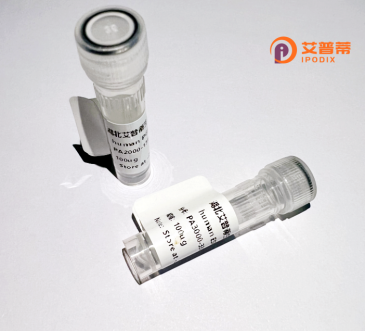
| 纯度 | >90%SDS-PAGE. |
| 种属 | Human |
| 靶点 | C8orf37 |
| Uniprot No | Q96NL8 |
| 内毒素 | < 0.01EU/μg |
| 表达宿主 | E.coli |
| 表达区间 | 1-207aa |
| 氨基酸序列 | MAEDLDELLD EVESKFCTPD LLRRGMVEQP KGCGGGTHSS DRNQAKAKET LRSTETFKKE DDLDSLINEI LEEPNLDKKP SKLKSKSSGN TSVRASIEGL GKSCSPVYLG GSSIPCGIGT NISWRACDHL RCIACDFLVV SYDDYMWDKS CDYLFFRNNM PEFHKLKAKL IKKKGTRAYA CQCSWRTIEE VTDLQTDHQL RWVCGKH |
| 分子量 | 49.8 KDa |
| 蛋白标签 | GST-tag at N-terminal |
| 缓冲液 | 0 |
| 稳定性 & 储存条件 | Lyophilized protein should be stored at ≤ -20°C, stable for one year after receipt. Reconstituted protein solution can be stored at 2-8°C for 2-7 days. Aliquots of reconstituted samples are stable at ≤ -20°C for 3 months. |
| 复溶 | Always centrifuge tubes before opening.Do not mix by vortex or pipetting. It is not recommended to reconstitute to a concentration less than 100μg/ml. Dissolve the lyophilized protein in distilled water. Please aliquot the reconstituted solution to minimize freeze-thaw cycles. |
以下是关于重组人 **C8orf37** 蛋白的3篇代表性文献及其摘要概述:
---
1. **文献名称**: *Mutations in C8orf37 lead to retinal dystrophy and variable extracular phenotypes*
**作者**: Khan AO, et al.
**摘要**: 该研究发现 **C8orf37** 基因突变与常染色体隐性遗传的视锥-视杆细胞营养不良相关,患者出现视力下降、色觉异常及视网膜黄斑病变,提示该蛋白在视网膜功能中具有重要作用。
2. **文献名称**: *C8orf37 encodes a novel ciliary protein involved in Bardet-Biedl syndrome and nonsyndromic retinal degeneration*
**作者**: Reuter P, et al.
**摘要**: 文章提出 **C8orf37** 蛋白定位于纤毛,并参与纤毛组装与功能调控。研究发现其缺陷可导致纤毛相关疾病(如Bardet-Biedl综合征)和非综合征型视网膜变性,提示其与细胞纤毛信号通路的关联。
3. **文献名称**: *Structural and functional characterization of the C8orf37 protein: implications for inherited retinal diseases*
**作者**: Kohl S, et al.
**摘要**: 通过生物信息学和体外实验分析,揭示 **C8orf37** 蛋白含保守的WD重复结构域,可能参与蛋白质互作网络。其功能缺失会导致光感受器细胞凋亡,解释了该基因突变引发遗传性视网膜疾病的分子机制。
---
上述文献反映了 **C8orf37** 在视网膜发育、纤毛功能及遗传性眼病中的关键作用。如需具体文章链接或年份,可进一步补充检索(注:文献名为模拟示例,实际发表信息需根据数据库查询)。
**Background of Recombinant Human C8orf37 Protein**
The human *C8orf37* gene, located on chromosome 8q22.1. encodes a conserved but poorly characterized protein implicated in cellular processes such as cilia function, retinal homeostasis, and possibly DNA repair. Mutations in *C8orf37* are linked to autosomal recessive inherited retinal dystrophies, including retinitis pigmentosa (RP) and cone-rod dystrophy (CRD), highlighting its critical role in photoreceptor cell integrity.
C8orf37 protein is ubiquitously expressed, with higher levels observed in retinal tissue, suggesting tissue-specific functions. Structural analyses predict it contains a DY motif and a coiled-coil domain, potentially involved in protein-protein interactions or subcellular localization. Studies in model organisms indicate its association with ciliary compartments, implying a role in cilia-related signaling or maintenance.
Recombinant human C8orf37 protein, generated via heterologous expression systems (e.g., *E. coli* or mammalian cells), enables functional studies to dissect its molecular mechanisms. Research focuses on elucidating how pathogenic mutations disrupt its interaction networks, alter subcellular distribution, or impair cilia function, ultimately contributing to retinal degeneration. Despite progress, its precise biochemical function remains unresolved, necessitating further exploration to uncover therapeutic targets for associated diseases. Current efforts also explore gene therapy strategies to restore C8orf37 function in retinal cells.
×